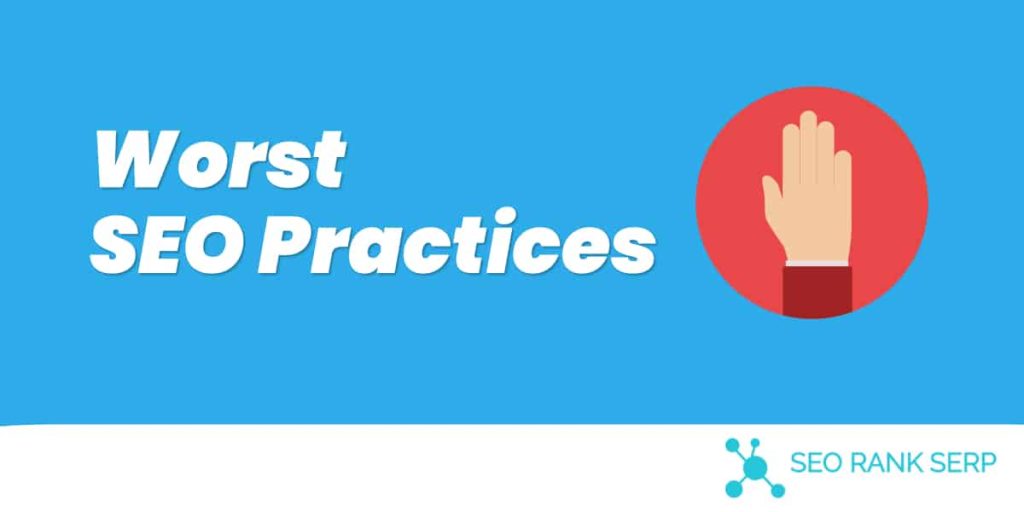The internet is a dynamic area where new trends are developing in a very fast paced environment. Nonetheless, the need to spend time and resources in search engine optimization (SEO) is one aspect that has remained constant. It is still the most known aspect of internet marketing, given the crucial role of SEO practices. The search engine was the new Wild Wild West back in 2004, where advertisers could quickly spam their way to the top results pages of the search engine (SERPs).
Over the years, the search engine environment has been simplified by Google algorithm updates like Panda, Penguin and Pigeon, making it important to know about 2020’s worst SEO practices and, more importantly, how to prevent them.

Why Bother about SEO?
A recent survey published in the Search Engine Journal shows that 93% of all internet encounters begin with a search engine. The same study shows that SEO leads have a closing rate of 14.6% higher than outbound marketing techniques such as direct mail with a real closing rate of 1.4%.
A related SEO study published by Smart Insights notes that organic search accounts for more than 95 percent of all search result clicks with only 5 percent of all traffic accounts paying for search results. However, 57 percent of the surveyed B2B marketers claim that SEO performs better in lead generation than any other marketing initiative.
The Rise of Black Hat SEO
Those numbers emphasize the importance of getting your search engine ready for your website. Many webmasters are desperate to get higher rankings on SERPs for ranking keywords with increasing competition on the internet platform. These high ranking reportedly results in more traffic resulting in higher conversion rates.
That’s what spawned SEO black hat, which is now a fully developed industry.
Black hat tactics carry your website to the top of the SERP rating in a short time, but this is until Google catches up with you and administers harsh penalties ranging from devaluation of some web pages or even removal of your website. Google Webmaster Policies are flouting these standards and must be avoided at all costs.
Here are some of the worst SEO activities you should know about in 2020:
1. Negative SEO
This is a common SEO practice today with it being included in their packages by many businesses. The idea is to try to beat your competition by submitting or sending backlinks of low quality to your site with a specific web page being the target.
Google dominates 88.37% of the search engine market and yours will rank higher if your rivals ranking goes lower. Nonetheless, the penalty will be on the SERP until Google finds out how, and they certainly do. Although competitor research is an integral part of SEO marketing, you should only use your insight to develop your approach and not devalue the website of your competitor.
2. Paid Links
Overemphasize is not in our vocabulary when it comes to the position of link building. This is what pushes webmasters to pay for links, which have been consistently warned against by Google. Although links will raise the ranking of your site for a specific keyword on SERPs, the emphasis will not be on content quality, and this is the main reason why this is flagged today as a black hat technique. Most of the links available come from websites of low quality that effectively reduce the overall user experience. Google is warning against this SEO practice this is the main reason.
True reason why people link to your site is because you have great quality. Once Google finds out that you do not have great quality and other sites are linking to you, what do you think will happen? Focus on writing the best article for your readers if you want to build links. There is no other strategy.
3. Cloaking
Cloaking is a process that involves providing the search engines with one web page and creating different user pages. The strategy of black hats is used to rate highly for unique keywords. The page created for bots guarantees a higher ranking, but site visitors will not receive content of quality.
Essentially, you’re trying to play the system, and that’s what makes cloaking one of today’s worst SEO practices to avoid. Your SEO strategy should focus more on user experience (UX) and not just on ranking. Search engines are now smarter and the high ranking you’ve enjoyed for a short time will disappear immediately when you’re caught.
5. Buying old domain names
There are some SEO agency out there that wants to do the easiest wins to make the quickest bucks. If that means buying an old age domain name with a few backlinks and redirecting it to your site, they will do it to produce or report you the results they produced to keep you paying for the service. If this is the case, what other corners are being cut? are they really optimizing your sites SEO? It takes $10-$20 to buy a good expired domain, when the time should be spent in optimizing your sites for best user experience, content quality. If your SEO agency is doing this, they just made 1000% their money if they are paying you for one months work.
6. Keyword Stuffing
This is one of the black hat SEO book’s oldest tricks and is still popular in 2020. The methodology is based on keywords as a component in the search ranking. A webmaster hopes that search engine bots can rate the website higher by tossing keywords throughout the content of the web page. This used to work but the search engines have been made very smart by algorithm changes today.
Google avoids keyword stuffing because the user experience is ruined. When you surpass the density of keywords above 1.5%, you are at risk of heavy punishment. Using keywords as such to provide users with a good experience on your web, instinctively and strategically.
7. Invisible keywords
Just because your keyword text is the same color as your site’s context doesn’t mean bot’s won’t notice it. This is a trick that black hats are trying to use to confuse search crawlers, but it’s totally ineffective and is likely to result in a penalty. I’m sure no one is using this method by any SEO agency, but if they do, they’ve been locked in a bomb shelter and don’t know the time or day. Especially if you just type your keywords 500 times in the hopes that you will actually rank them. Since search crawlers are robot-like machines, the Web is not seen the same way we do. We can’t see the “invisible” keywords, but bots will see CSS and HTML code to identify the background of your website and the color of your text. Putting keywords in your CSS code won’t do anything as well.
8. Spam Comments
The need for high levels of commitment and a chance to earn free backlinks has made spam comments one of today’s most common black hat SEO techniques. Webmasters engaged in automated spam to leave comments on target sites due to the popularity of blogging and social media networks. This not only leads to poor user experience, it also gives the readers a bad impression. Today, you are dealing with an Internet user who knows everything about spam. Finally, search engines will also catch up with you contributing to the ranking down.
Even to this day, the comments being left doesn’t make any sense. At least try to word those comments like a human would write it.
9. Poor Content
In SEO marketing, the content is king is an undeniable fact. Better content can increase blog traffic by up to 2,000%. (Source: ThemeIsle). Content marketing‘s important role has resulted in similar black hat SEO strategies including duplicate content, twisted content, and automated content. All of these lead to poor user experience and are therefore marked by Google as SEO activities to avoid.
These are just a few of 2020’s worst SEO practices, and the list is a lot longer. As a webmaster, it is recommended that you stay up-to-date with the search engine algorithm to know what you should incorporate into your SEO strategy and what to stop.
10. Generated content
One obvious black hat tactic is to have a “write” content for your site from a robot or computer program. At some point in your perusal of the Internet, you may have come across text spit out of a content generator. It’s that text that makes absolutely little sense, but it includes essential keywords or phrases.
This horrific SEO tactic is meant to save time and results for webmasters, but the costs outweigh any potential gains significantly. Everyone can tell you that you’re spamming. You’re going to be penalized, if not absolutely deindexed. Be honest and get used to the concept of devoting time to the content of your domain if you really want to do well on the Internet.
11. Duplicating someone else’s content
Of course, the only worse thing than duplicating your own content is to duplicate the content of someone else. Google sees offsite content duplication as a lack of effort and plagiarism in some cases. In order to ensure that you always play by the rules, the best practice is to always compose and write new material.
12. Fake review
Schema.org structured data is a wonderful tool to use if you want review star ratings for your site. But this also means that you can also create fake review star rating. You might have 3 out of 5 star rating for your product, but you can change the rating, see the example below:
<script type=“application/ld+json”>{
“@context”:“http://schema.org”,
“@type”:“Product”,
“aggregateRating”:{
“@type”:“AggregateRating”,
“ratingValue”:“3.5”,
“reviewCount”:“11”
},
“description”:“0.7 cubic feet countertop microwave. Has six preset cooking categories and convenience features like Add-A-Minute and Child Lock.”,
“name”:“Kenmore White 17″ Microwave”,
“image”:“kenmore-microwave-17in.jpg”,
“offers”:{
“@type”:“Offer”,
“availability”:“http://schema.org/InStock”,
“price”:“55.00”,
“priceCurrency”:“USD”
},
</script>
All you have to do is change the value and the count and add it to your HTML for that page. Google will try to retrieve this information and provide the rating to your SERPs. Whether Google validates or finds source before publishing this information might be unknown, but there are SEO agency who does this for a living to get a better CTR.
13. Misleading headlines
Lastly, I ‘d like to throw misleading headlines under the bus. This is a personal pet peeve of mine–and for good reason. Here’s what I’m talking about:
You see a Twitter link for an article titled “These 15 Things Will Remove Fat Completely.” When you click on the link, though, all the post talks about is why people should eat vegetables and how vegetables have water, mentioning “studies show”, blah blah blah. How does my life change?!
SEOs have become so obsessed with getting clicks that they forget what really matters: transforming those clicks into actual fans and translating those visits into sales. To do this, you must create content that is authentic and meaningful. If you continue to post misleading headlines, you might get a few clicks off them.
Heck, you may get loads of clicks through rate. But most of those viewers will bounce as soon as they realize you’ve misled them. And then what are you going to have? A few hundred clicks and a bounce rate that is ridiculously high. Hmmm… Hyperbolic blog titles like those that use the words “shocking” or “terrifying” to mislead people on a website are clickbait. And while a specific penalty may not exist, it’s just a tacky marketing strategy. If you want long-term loyalty, your consumers need to appreciate and connect on a genuine basis with your content–this is clearly not encouraged by clickbait.
Conclusion
SEO consists of many ethically sound and honest practices… these are just none of them. If you have a concern about best and worst SEO practices, reach out to us! We would love to help you make your strategy for SEO even better than it already is.

Jay
I've worked for WooRank, SEOptimer, and working on a cool SEO audit tool called SiteGuru.co. Now I have build Linkilo and SEO RANK SERP WordPress theme. I've been in the SEO industry for more than 5 years, learning from the ground up. I've worked on many startups, but also have my own affiliate sites.
TRY OUR FULLY SEO-OPTIMIZED WORDPRESS THEME FOR AFFILIATE MARKETERS!
No need to hire SEO experts anymore to fix your site technical SEO issues
IMPROVE YOUR SITES RANKING TODAY